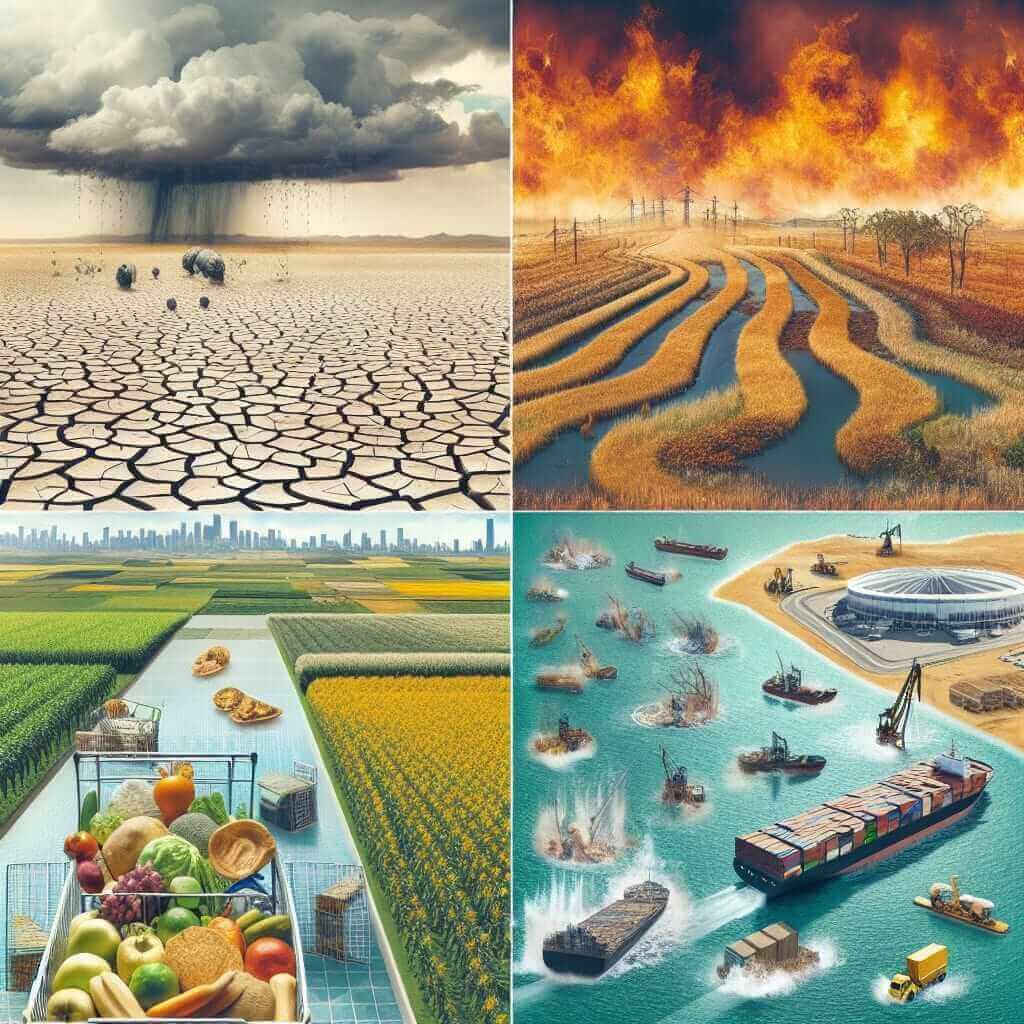The IELTS Reading section tests your ability to quickly and accurately comprehend written English in an academic context. Understanding how topical issues, such as climate change and its effects on global food distribution, are presented in reading passages can help you prepare more effectively. This article provides a sample IELTS reading passage, questions, and detailed answers to help you practice and improve your Reading skills. Due to the increasing frequency and importance of climate change discussions, this topic is highly relevant and likely to appear in future IELTS exams.
Sample Reading Passage on Climate Change and Global Food Distribution
Passage: Climate Change and Its Impact on Global Food Distribution (Medium Text)
Climate change is one of the most pressing issues facing humanity today. Its impacts are vast and varied, affecting everything from ecosystems to economies. One of the critical areas where climate change is having a pronounced effect is on global food distribution.
As the planet warms, weather patterns become more unpredictable. This results in extreme weather events such as droughts, floods, and hurricanes, which can devastate crops and disrupt food supply chains. For instance, extreme droughts in regions like sub-Saharan Africa have reduced agricultural productivity, leading to food shortages and increased prices. Conversely, flooding in countries like Bangladesh has ruined vast tracts of arable land, making it challenging to cultivate crops.

Moreover, climate change is influencing the geographical distribution of food production. Traditionally temperate regions are experiencing shifts in their growing seasons, while tropical regions are becoming too hot to sustain traditional crops. For example, coffee production is under threat in countries like Brazil and Vietnam due to rising temperatures and changing precipitation patterns. This shift not only affects the local economies but also impacts global food prices and availability.
Agricultural supply chains are particularly vulnerable to climate change. Transportation networks, crucial for moving food from farms to markets, can be disrupted by extreme weather events. Ports, roads, and railways can be damaged by storms, making it difficult to transport goods. Furthermore, storage facilities may not be equipped to handle fluctuations in temperature and humidity, leading to increased food spoilage.
Addressing these challenges requires a multi-faceted approach. Improving agricultural practices to make them more resilient to changing climates is essential. This may involve developing drought-resistant crop varieties, adopting sustainable farming practices, and improving water management systems. Additionally, enhancing infrastructure to withstand extreme weather conditions can help maintain the stability of food distribution networks.
In conclusion, the impacts of climate change on global food distribution are profound and multifaceted. As climate change continues to progress, it becomes increasingly crucial to develop adaptive strategies that ensure food security for populations worldwide.
IELTS Reading Exercise Questions
Questions
Multiple Choice
-
According to the passage, what are some of the direct effects of climate change on agriculture?
- A. Increased technological advancements in farming
- B. Reduced agricultural productivity due to extreme weather events
- C. Greater reliance on fossil fuels
- D. Enhanced global cooperation on environmental issues
-
Which regions are particularly mentioned as being affected by drought?
- A. South America
- B. Sub-Saharan Africa
- C. Southeast Asia
- D. Northern Europe
True/False/Not Given
-
The passage states that all tropical regions are becoming too hot for traditional crops. (True/False/Not Given)
-
Improved infrastructure alone is enough to address food distribution challenges caused by climate change. (True/False/Not Given)
Matching Information
-
Match the following climate change impacts with the regions mentioned in the passage:
-
- Extreme droughts
-
- Flooding
-
- Threat to coffee production
-
A. Bangladesh
-
B. Sub-Saharan Africa
-
C. Brazil and Vietnam
-
Answer Key
- B – The passage clearly states that extreme weather events like droughts and floods reduce agricultural productivity.
- B – The passage mentions sub-Saharan Africa as being affected by extreme droughts.
- False – The passage mentions that tropical regions are becoming too hot for traditional crops but does not state that this applies to all tropical regions.
- False – The passage suggests a multi-faceted approach, including improved agricultural practices and infrastructure enhancements, to address the challenges.
-
- 1 – B (Sub-Saharan Africa is mentioned in relation to extreme droughts)
- 2 – A (Bangladesh is mentioned in relation to flooding)
- 3 – C (Brazil and Vietnam are mentioned in relation to the threat to coffee production)
Common Mistakes
- Misunderstanding Passage Context: Students often misinterpret the context of a passage due to unfamiliar vocabulary. Practicing similar passages can help build contextual understanding.
- Ignoring Keywords: Not paying attention to keywords can lead to incorrect answers. Always identify and focus on keywords within the questions and the passage.
- Time Management: Spending too much time on one section can leave insufficient time for others. Practice managing your time by setting limits for each question.
Vocabulary
- Devastate (v.) /ˈdɛvəsˌteɪt/ – to destroy or ruin something.
- Arable (adj.) /ˈærəbəl/ – suitable for growing crops.
- Precipitation (n.) /prɪˌsɪpɪˈteɪʃən/ – any form of water, such as rain or snow, that falls from the atmosphere.
- Spoilage (n.) /ˈspɔɪlɪdʒ/ – the process of decay or rotting in perishable food products.
Grammar
- Using Present Continuous for Ongoing Actions:
- Example: “The planet is warming, and weather patterns are becoming more unpredictable.”
- Present Perfect for Indefinite Past:
- Example: “Climate change has influenced the geographical distribution of food production.”
Advice for High Reading Scores in IELTS
- Regular Practice: Engage with diverse reading materials such as news articles, research papers, and academic journals on current issues like climate change.
- Enhance Vocabulary: Build a strong vocabulary base related to common IELTS topics.
- Mock Tests: Take regular mock tests under timed conditions to improve speed and accuracy.
- Analyze Mistakes: Review incorrect answers to understand your mistakes and avoid repeating them.
- Stay Updated: Keep yourself informed about global issues to enhance your comprehension of contemporary topics that may appear in the exam.